Magazine-artikelen, augustus tot december 2020
Cultuur als energie voor de toekomst
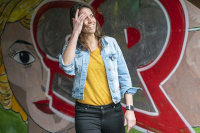
De provincie Groningen gaat nog steeds aan kop als het gaat om de grootste krimp in Nederland. Het noordelijke platteland loopt al jaren leeg. Dit heeft grote gevolgen voor de leefbaarheid in dorpen. Hoe kun je er voor zorgen dat de veerkracht van de dorpen blijft behouden en zelfs wordt versterkt? Met deze vraag houdt Gwenda van der Vaart, assistent professor bij de Faculteit Ruimtelijke Wetenschappen, zich bezig.
Lees meer
Duiken naar de regenboog
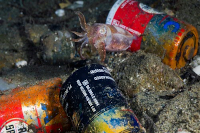
Sancia van der Meij groeide op tussen de Drentse heidevelden en bossen, maar toen ze op haar achttiende leerde duiken op een koraalrif was ze verkocht. Ze werd zeebioloog. Aan de hand van piepkleine galkrabben probeert ze nu te doorgronden hoe ongewervelde dieren samenleven op soortenrijke koraalriffen. Ze stelde onlangs met fotograaf Alan Powderham een boek samen over het onderwaterleven in de Koraaldriehoek in Zuidoost-Azië: At the Heart of the Coral Triangle – Celebrating Biodiversity, een “scientific coffee table book”.
Lees meer
CogniGron al twee jaar op weg naar ‘menselijke’ computer
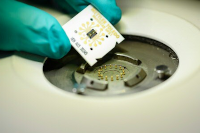
De computer: de machtige machine van weleer loopt tegen zijn grenzen aan. Onderzoekers van de RUG, verenigd in het centrum CogniGron, werken daarom aan de computer van de toekomst. Na twee jaar maakt Beatriz Noheda, directeur van CogniGron, de balans op. Een nieuwe superrekenaar laat natuurlijk nog wel even op zich wachten, maar CogniGron heeft al veel bereikt.
Lees meer
Wie laat zich na de dood oplossen?
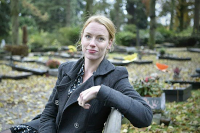
Natuurbegraafplaatsen rukken op in Nederland. Maar er zijn meer manieren om ons op een milieuvriendelijke wijze aan de eeuwigheid toe te vertrouwen. Brenda Mathijssen ontving onlangs een Veni-beurs van NWO om onderzoek te doen naar duurzame uitvaartpraktijken. Want van traditionele uitvaart tot het net goedgekeurde oplossen in een vloeistof: duurzaamheid verovert een plek in het uitvaartwezen.
Lees meer
‘Erfgoed in oorlogstijd is kwetsbaar, maar ook weerbaar’
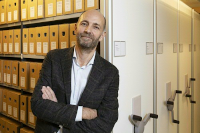
Erfgoed is kwetsbaar in oorlogstijd en de vernietiging ervan kan onderdeel zijn van genocidale processen. Denk aan de boekverbrandingen in Nazi-Duitsland. Maar we weten te weinig van de weerbaarheid van erfgoed en de impuls die het juist door geweld kan krijgen. Dat laatste maakt het onderzoek ernaar alleen maar relevanter, vindt Martijn Eickhoff.
Lees meer
Begrijpen hoe de menselijke geest werkt
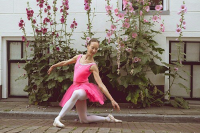
Beroepsballerina worden. Graag. Als het had gekund. Nu is Marieke van Vugt met evenveel plezier hersenwetenschapper aan de RUG. Bij haar pogingen te ontrafelen hoe de menselijke geest werkt, kan ze nog steeds niet zonder ballet. En ook niet zonder boeddhisme.
Lees meer
Eerlijk delen in de nieuwe economie
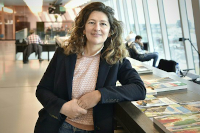
Gereedschap uitlenen via Peerby, je woning verhuren via Airbnb, een scooterritje via Felyx. Het zijn voorbeelden van de deeleconomie. We delen spulletjes om minder te hoeven produceren. Goed voor de aarde en voor de portemonnee. Maar de deeleconomie brengt ook vragen met zich mee. Over rechten, plichten en aansprakelijkheid. Rosalie Koolhoven wil daar duidelijkheid in brengen.
Lees meer
Archeologie over de grenzen heen
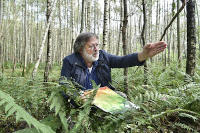
Hij leerde zichzelf het Nederduitse dialect aan. Want, zegt hij, als je contact wilt met boeren in de grensregio, kom je niet zover met Hooghaarlemmerdijks. Het typeert Henny Groenendijk, die als hoogleraar Archeologie en Maatschappij niet alleen geïnteresseerd is in de geheimen van de bodem, maar vooral verbinding zoekt met de mensen die erop wonen.
Lees meer
Marketing: een balans tussen gegevensanalyse en privacy
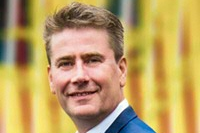
Gegevens vormen de nieuwe brandstof van marketingactiviteiten. Ze helpen om de juiste klanten op het juiste moment met het juiste instrument te benaderen. Maar het gebruik van gegevens wordt beperkt door nieuwe privacyregels. Hoe kunnen marketeers nog steeds optimaal gebruikmaken van gegevens zonder dat ze deze privacyregels overtreden? Jaap Wieringa, hoogleraar aan de Faculteit Economie en Bedrijfskunde, heeft samen met zijn team nieuwe marketingmodellen ontwikkeld die een antwoord geven op deze vraag en bewijzen dat gerichte marketing nog steeds mogelijk is, ook binnen de nieuwe privacyregels.
Lees meer
Fotoreportage: Verwondering in het Filmarchief
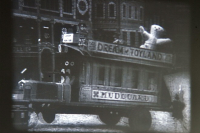
Het Filmarchief van de RUG verdient eigenlijk een andere naam. Hier kun je je ogen uitkijken – letterlijk bijna, want het archief herbergt stellingen vol filmblikken, goed voor uren aan oud en bijzonder filmmateriaal. Maar dat is niet alles. Ook toestellen en apparaten waarmee al in een ver verleden beelden werden gemaakt of geprojecteerd staan hier: toverlantaarns, stereoscopen, camera’s en projectoren van circa honderd jaar geleden, een montagetafel van cineast Bert Haanstra…
Lees meer
Meer kennis, minder stigma
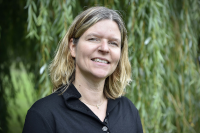
Chronische vermoeidheid, prikkelbaredarmsyndroom, aanhoudende spierpijnen – het zijn voorbeelden van klachten waar meestal geen lichamelijke oorzaak voor wordt gevonden. Als gevolg krijgen zulke klachten snel het label ‘psychisch’. Onterecht, zegt hoogleraar Psychosomatiek Judith Rosmalen. Zij doet onderzoek naar het ontstaan, het voorkomen en de behandeling van onbegrepen klachten, waarbij ze ook enkele hardnekkige vooroordelen wil bestrijden.
Lees meer
'De coronacrisis gaat veel huishoudens opbreken’
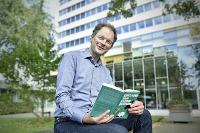
Veel gezinnen en bedrijven hebben te weinig spaargeld om de coronacrisis goed door te komen. Econoom Dirk Bezemer maakt zich zorgen. ‘Er ontstaan dramatische situaties als de deken van overheidssteun straks wordt weggetrokken. Als we nu onze economie en financiële stelstel niet veranderen, dan worden de multinationals straks beschermd en de bijstandsgezinnen niet.’
Lees meer
De stad moet op de schop
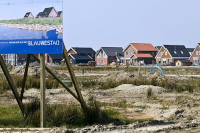
Onze steden staan op een kantelpunt, stelt planoloog Ward Rauws. Klimaatverandering, het verlies aan biodiversiteit en het enorme energieverbruik dwingen ons om steden anders in te richten. Dat is in de geschiedenis vaker gebeurd. Denk aan de opkomst van de stad als centrum van productie, ten tijde van de industriële revolutie. De wederopbouw na de Tweede Wereldoorlog leidde tot de moderne stad met auto’s, hoogbouw en een planmatige opzet. Daarna volgde de stad met het suburbane wonen. Steeds is de manier waarop we de stad gebruiken en inrichten fundamenteel veranderd.
Lees meer
Socialer na een biertje. Klopt dat wel?
Marije aan het Rot zoekt het uit
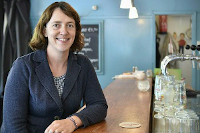
Mensen dénken vaak dat ze socialer worden na het drinken van alcohol. Marije aan het Rot, onderzoeker en docent bij de afdeling Psychologie van de RUG, gaat uitzoeken of dat wel klopt. Ze ontving voor haar onderzoek 5.000 euro van het Kennisinstituut Bier.
Lees meer
Corona: gouden kans voor e-bike
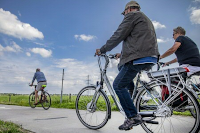
‘Never let a good crisis go to waste,’ zei Winston Churchill. Dat geldt ook als je het gebruik van de elektrische fiets wilt bevorderen. Gewoontedieren – zoals wij mensen – zullen hun gedrag eerder veranderen als hun leven op de kop wordt gezet. De ongemakken van de coronapandemie kunnen daarom een prima prikkel zijn om eindelijk eens over te stappen op die e-bike.
Lees meer
Een nieuwe blik op de filosofische canon door Artificial Intelligence
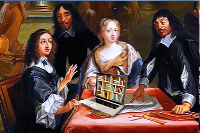
Door publicatiedruk en bureaucratische rompslomp moeten universitaire filosofen zich steeds vaker beperken tot ‘enkele grote werken van enkele grote auteurs’. Dat is problematisch wanneer je kerntaak diepe bezinning is, en al helemaal als je een accuraat en compleet beeld wilt schetsen van een van de meest invloedrijke filosofische takken uit de geschiedenis: de vroegmoderne natuurfilosofie. Dr. Andrea Sangiacomo van de Faculteit Wijsbegeerte schakelde daarom de hulp in van het team Data Science van het Centrum voor Informatie Technologie (CIT) dat met behulp van Artificial Intelligence tot verfrissende inzichten kwam.
Lees meer
Agro-ecologie, afkijken van de kleine boer
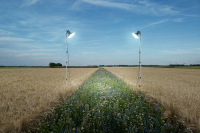
Het Wereld Natuur Fonds heeft in Groningen een leerstoel ingesteld voor Pablo Tittonell. De reislustige hoogleraar zoekt de oplossing voor de mondiale agrarische problemen in ‘natuurgedreven landbouw’, de agro-ecologie. Boerenbedrijven van alle soort en maat op de hele wereld onderzocht hebbende, laat hij zich vooral inspireren door de methoden van de kleine boer.
Lees meer
Een energiecentrale die broeikasgassen opneemt
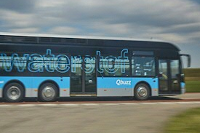
Aravind Purushothaman Vellayani, ofwel P.V. Aravind, is zijn hele carrière al bezig energiesystemen efficiënter en duurzamer te maken. Sinds 2019 is hij in Groningen hoogleraar Energy Conversion en werkt hij aan brandstofcellen die brandstof in stroom omzetten en andersom. Waterstof is zo’n brandstof.
Lees meer
